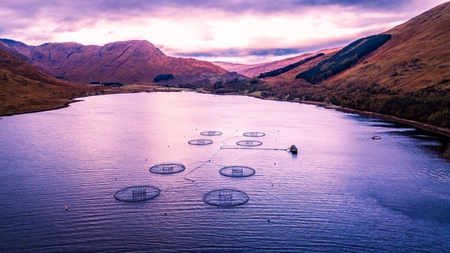Researchers at the University of Aberdeen have developed an advanced underwater holographic camera which they aim to use alongside artificial intelligence (AI) techniques to help Scotland's fish farmers manage sea lice.
The team from the University’s School of Engineering, that include Dr Thangavel Thevar, Dr Andrew Starkey, and Prof John Watson, is working alongside the Scottish Association for Marine Science (SAMS) as part of the project, which has received a £538,000 funding boost from the UK Seafood Innovation Fund (SIF) and project partners.
The experts in engineering and digital holography have been combining holographic 3D imaging with AI-based automated image identification technology to identify the natural presence and abundance of microscopic sea lice larvae in the ocean. The technology now aims to help fish farmers rapidly detect and manage the parasite, which pose a significant challenge to Scottish salmon farms.
Electronics business Hi-Z 3D, seafood producer Mowi, the Sustainable Aquaculture Innovation Centre (SAIC), the Scottish Environment Protection Agency (SEPA) and the Scottish Government's Marine Directorate are also supporting the initiative.
Currently, the most common way of testing for the sea lice is to collect water samples to be analysed in a lab under a microscope, which can take several days to return results. However, the holographic camera can instantaneously record a volume of water and extract high-resolution images of the various particles present in the water providing a set of data equivalent to thousands of standard photographic images.
Identifying sea lice from other zooplankton species has previously been compared to looking for a ‘needle in a haystack’, so the researchers are using AI techniques to support the process of identifying sea lice when the tool is deployed.
Dr Thangavel Thevar from the University of Aberdeen’s School of Engineering said: “The type of camera being used in this project was first developed for the identification of marine organisms and microparticles in the ocean. However, as it provides an accurate reflection of the different species present in the water, we saw an opportunity for the tool to be used to support the aquaculture sector with fish health management.
“The holographic imaging technology will be supported by AI and machine learning, which will help with the identification and cut processing time significantly. A major element of the project is to train the tool to recognise sea lice over other species, and the images gathered over the next 18 months will help us to create the baseline for future analysis.”
In order to train the software to detect the parasite, SAMS has set up a dedicated sea lice hatchery for the project and will be supplying sample images that will be used as a starting point for the imaging tool. Digitally labelled holographs will be fed into the system to help train it to separate sea lice from other plankton species.
In the future, the system could be used by seafood producers as an early indication of sea lice at the larval stage, as well as being integrated into management strategies.
Dr Helena Reinardy, aquaculture researcher at SAMS, said: “Sea lice are a concern for the aquaculture sector and regulators and one of the first steps to managing them is to identify whether they are present in the water. Currently, samples are taken using a zooplankton net which requires a lot of time and specialist expertise to pick through all the abundance of zooplankton to find and identify sea lice larvae. This new system could provide an opportunity for more regular and accurate monitoring to provide an early indication of potential sea lice risks and, by the end of this project, we hope to be ready for trialling the system at sea.”
Heather Jones, CEO of SAIC, added: “We have fantastic technology coming out of Scotland’s universities and it is exciting to see how new data-led techniques could support aquaculture to thrive. This system could become a valuable tool in our armoury for sustainably tackling the challenge of sea lice on salmon farms. Collaboration is a crucial element of its development, and this project could be transformational for fish health management, delivering economic value for the sector while minimising its environmental footprint.”


